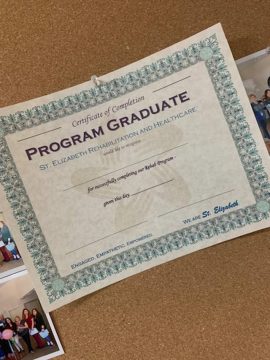By Dennis Baloy, DOR, St. Elizabeth Healthcare & Rehabilitation, Fullerton, CA
Our facility is heavy on short-term patients (HMO and Medicare). Most patients come from St. Jude Hospital. Our payer sources and MDs are as aggressive and enthusiastic as the staff and team that we have. We wanted to capitalize on this and incorporate our group and concurrent treatment along the way. We came up with St. Elizabeth’s F.A.S.T. Pace Rehabilitation Program.
F.A.S.T. stands for Function and Ability based interventions for Safe and successful Transition to Home.
St. Elizabeth Healthcare & Rehabilitation prides itself on improving patient outcomes and providing excellent customer service. Our therapy programs are evidenced-based and patient-centered, implemented within a fun, encouraging and supportive atmosphere. Our goal for each resident is to go back home or to a safe discharge environment.
The F.A.S.T. rehab program includes:
- Client-centered goals
- Family involvement during therapy
- Education with patient and caregiver to increase self-efficacy and empowerment
- Use of group and concurrent activities (enhances motivation, engagement and commitment to goals)
- Teaching of home exercise program/home accessibility recommendation
- Provide adaptive equipment and teach compensatory techniques
- Address instrumental ADLs (cooking, stair climbing, walking on uneven surfaces, etc.)
- Program Graduate Certificate for all residents successfully meeting their rehab potential
The following are some groups that have been implemented:
Corn Hole Board Activity — The game is social and involves a number of people from two to four. Physical movements that are required are the ability to toss/throw a beanbag. Cognitive demands include the ability to add and focus on the game. Emotional demands might include the ability to enjoy yourself and to handle competition positively.
Cooking Activity — Participating in meaningful, client-centered occupations is a cornerstone in the profession of occupational therapy in promoting health and well-being for patients. Occupational therapists can use group-based cooking interventions to increase quality of life, social participation and autonomy, and to decrease depression of patients who reside in LTC. (1)

Graduate Program — Every Wednesday, we hold a mini graduation rite for patients discharging home or to a lower level of care. We have staff (rehab and facility staff) line up in our lobby and hold a mini program that celebrates their journey in therapy.
